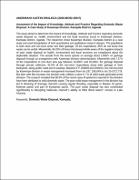| dc.description.abstract | ANDEMANI AUSTIN DRALEGA (2008-MO92-20047)
Assessment of the Impact of Knowledge, Attitude and Practice Regarding Domestic Waste Disposal: A Case Study of Kawempe Division, Kampala District, Uganda
The study aimed to determine the impact of Knowledge, Attitude and Practice regarding domestic waste disposal on, health, environment and the local economy (cost) in Kawempe division, Kampala district, Uganda. The researcher chose Kawempe division, Kampala district as a case study and used triangulation of both quantitative and qualitative research designs. The population in both slum and non-slum areas mix their garbage. Of the respondents, 85% do not know that waste can be useful. Meanwhile, 66.25% of those interviewed while aware of the negative impacts of poor waste disposal on health, environment and local economy are complacent about the deplorable situation. The sample from the slums spends on average about 2,000/= on garbage disposal through an arrangement with Kawempe division administration. Meanwhile only 7.5 % of the respondents in non-slum area pay between 15,000/= and 20,000/= for garbage disposal through private collectors. 92.5% of the non-slum respondents dump their garbage in their backyards, along public roads and in swamps. Between FY 2008/09 and 2009/10, the cost incurred by Kawempe division in waste management increased from shs 187, 536,049 to shs 314,072,778. But then with this increase, the division only collects a mere 6.7 % of solid waste generated at the division. The research revealed that 96.6% of the recent cases of epidemics reported in the division have been attributed to solid domestic waste. The poor solid waste management in the division has led to blocking of drainage channels causing regular flooding, especially in Bwaise III parish, Kalerwe parish and part of Kyebando parish. The poor waste disposal has also contributed significantly to disrupting Nakivubu channel‟s ability to filter flood waters‟ reroute to Lake Victoria.
Keywords: Domestic Waste Disposal, Kampala, | en_US |


